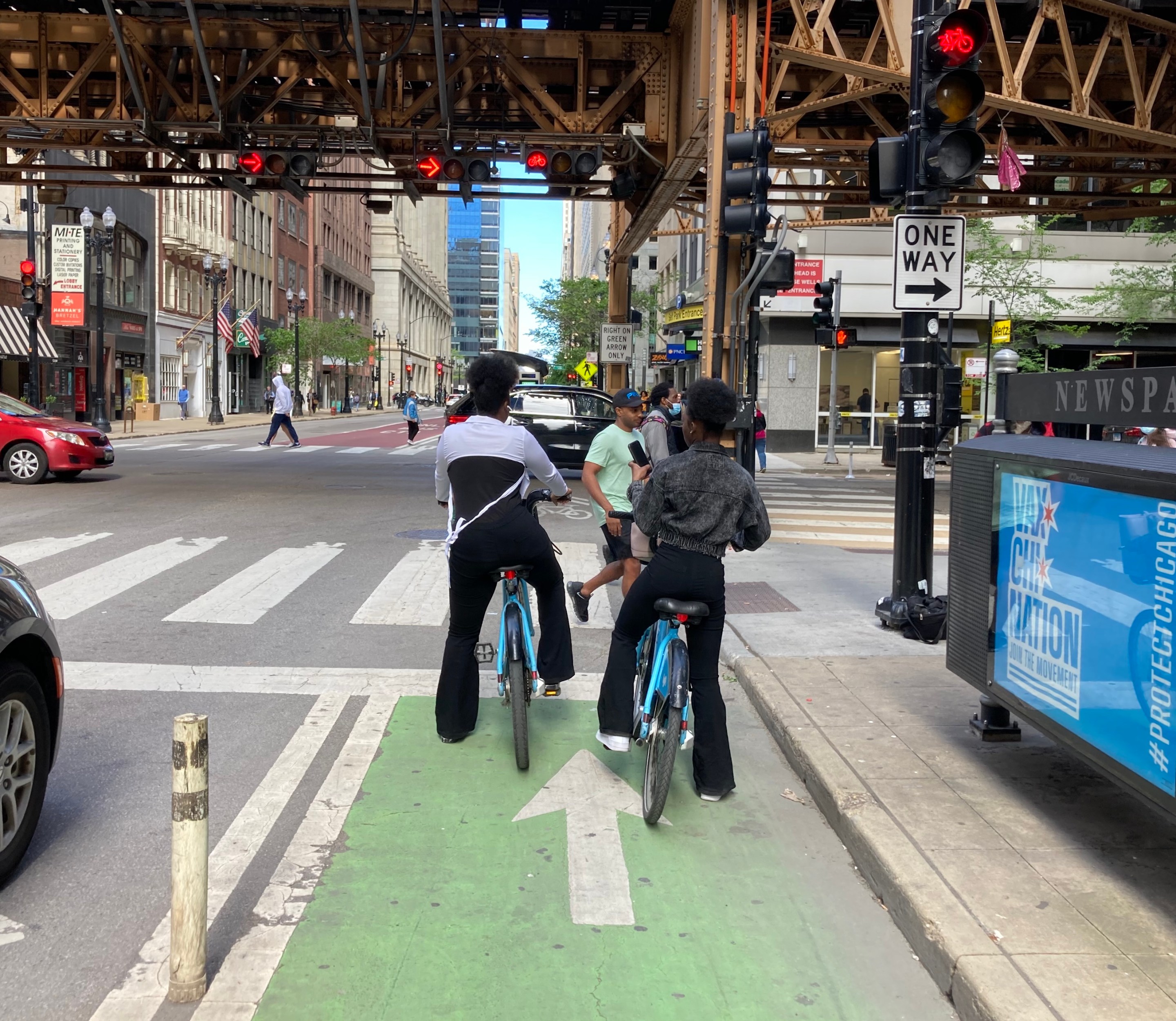Para leer este artículo en español, haga clic aquí.
In early May, Lyft, the concessionaire for Chicago's publicly-owned bike-share system Divvy, quietly and significantly changed the network's pricing structure. The most important difference was the elimination of the electric bike "fee waiver zone" in parts of the city south of Pershing Road (3900 W.) or west of Western Avenue (2400 W.)
How the pricing system previously worked
Chicagoans who live north of Pershing and east of Western, previously known as the "fee zone," tend to have relatively convenient access to both the older, blue non-electric bikes (Divvy calls these "Classic" bikes), as well as the newer, black or gray electric bikes, from their homes. Divvy annual members, who were paying $108 a year before the price change, can take as many up-to-45-minute trips as they like on the blue bikes, which can only be checked out or parked at full-service docking stations, for no additional charge. But prior to the pricing change, members living in the fee zone who choose to ride the e-bikes paid a per-minute surcharge, as well as a non-station parking fee if they ended their trip by securing their cycle to a rack or pole using its built-in cable lock, rather than parking at a station.
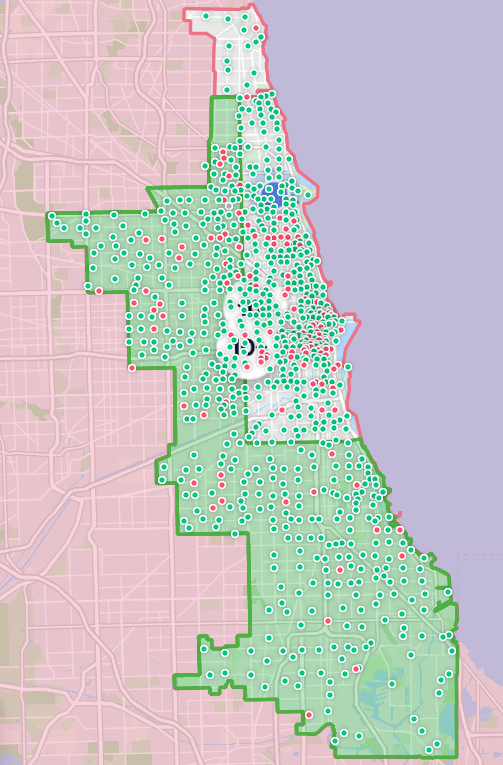
In contrast, parts of town outside those boundaries haver fewer full-service stations, or none at all. In outlying communities, Lyft is only installing "E-stations," glorified bike racks where only the electric bikes can be checked out or parked, and these are spaced farther apart than stations in more central neighborhoods. So residents south of Pershing or west of Western generally have less convenient, or nonexistent, access to the blue bikes from their homes.
Since theses Chicagoans often have no choice but to use the e-bikes, Divvy's old pricing system helped level the playing field by waiving the time surcharge and non-station fee for trips beginning or ending in the waiver zone.
The changes are announced
On April 11, the Chicago Department of Transportation, which oversees the system, and Lyft announced the upcoming changes, as well as the impending launch of Divvy's dockable e-scooters.
Under the new fee structure, the waiver zone would be eliminated, meaning that the special e-bike charges would apply everywhere in the coverage zone. The regular Divvy annual membership fee would be raised to $119, and the per-minute surcharge for e-bikes for regular members would go up by a penny to 16 cents (although the non-station parking fee would go down from $2 to $1.)
In an effort to reduce financial hardship for people with Divvy for Everyone (D4E) $5 memberships, available to Chicagoans making $35,310 or less, D4E members would be given $10 in free credit, good for surcharges and parking fees, each month for the next year.
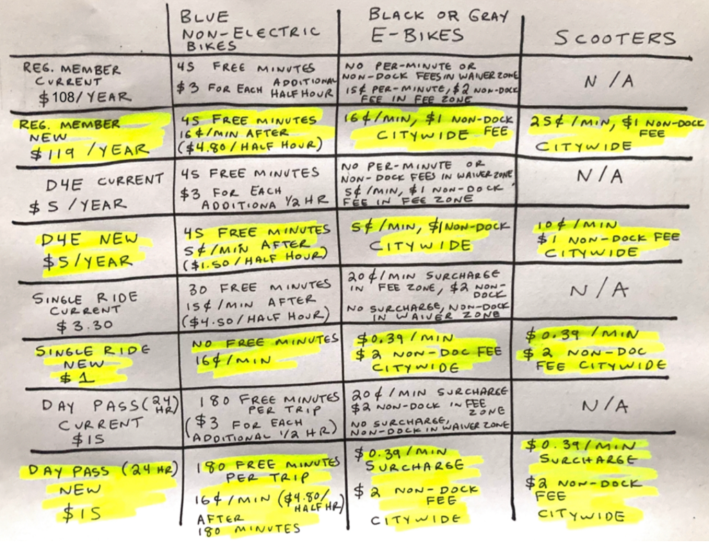
However, no community meetings were held to explain the new, somewhat complex, pricing structure to the public before it went into effect. And residents certainly weren't asked whether the changes were acceptable to them.
The changes (quietly) go into effect
On May 10, CDOT and Lyft held a ribbon-cutting at the downtown Thompson Center to celebrate the scooter rollout. But the press release for that event included only a brief, rather euphemistic reference to the fact the new fee structure was also kicking in that day. "In tandem with this launch, Divvy will be implementing a simplified pricing structure. Divvy and D4E members will continue to receive unlimited free unlocks, free rides up to 45 minutes on classic blue bikes, and significantly discounted per-minute and out-of-station parking fees for e-bikes and scooters through their existing memberships."
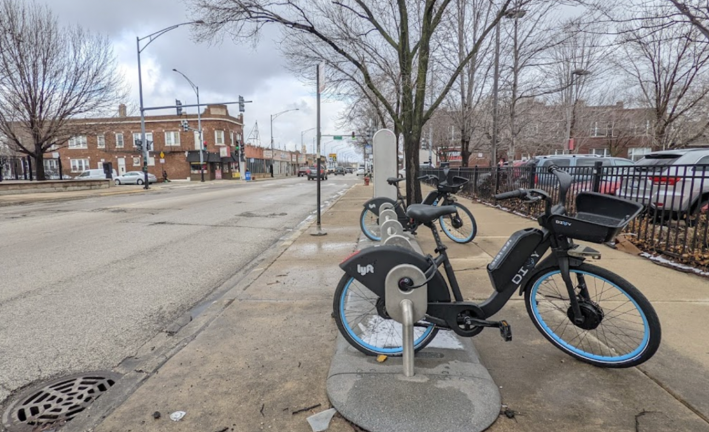
The news release's language emphasized that members would pay lower e-bike time surcharges and non-dock fees than non members. But it glossed over the fact that previously trips to and from the waiver zones didn't involve per-minute or out-of-station charges at all.
That day, many Divvy members were unpleasantly surprised to see they were getting extra charges for e-bike trips that didn't exist before. Lyft later said they sent Divvy members advanced notice of the new fee structure via email and the app. However, as a regular Divvy user, I never received an email or a notification on my smartphone. I asked other Divvy members and they said they didn't receive any warning either.
Here is the new Divvy pricing structure that started May 10. For a Divvy member to ride an ebike for 30 minutes will cost $5.80. A nonmember using "casual pricing" will pay $12.70 for 30 min on an ebike. Please share comments at outreach@divvybikes.com. @ChicagoDOT @DivvyBikes pic.twitter.com/404NVcQoMj
— Audrey Wennink (@awennink) June 4, 2022
How will the new pricing affect Chicago transportation?
Lately I've been thinking about how all these changes will impact Chicago's transportation cycling landscape. North Side Divvy members used to be able to ride e-bikes for free any time their trip started or ended west of Western. Now that they have to pay a per-minute fee for these rides, are they using blue bikes more often? And because, thanks to higher station density, North Siders have better access to non-electric cycles, has it become harder for South and West siders to find blue bikes at docking stations in their communities?
A few people have asked me to explain Divvy pricing, but decided not to sign up for a membership because they found the system too confusing. I wonder how many people will forgo or not renew Divvy memberships because the cost of riding is now too high. How many potential bike trips will instead be made by car as a result?
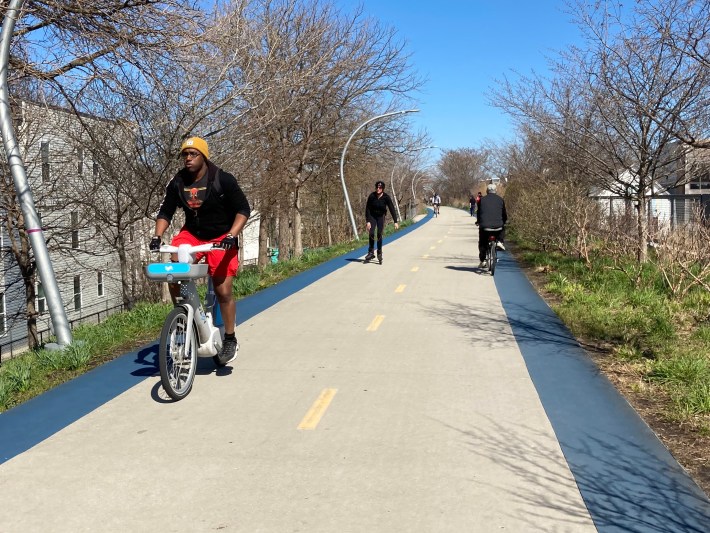
In a 2020 blog post Lyft's head of bike, scooter, and pedestrian policy Caroline Samponaro, formerly with the New York advocacy group Transportation Alternatives, claimed the company is “committed to providing affordable, reliable transportation in Chicago and our cities across the country.” I wonder how Lyft defines "affordable," and why they would make major pricing changes with minimal communication to members. I also wonder what CDOT’s role was in these changes, and how we can hold them accountable to their Strategic Plan and Climate Action Plan that highlight equity challenges and call for expanding the city’s walk, bike, and transit options.
The Lyft representative closed the forum I attended by stating that nothing is set in stone and that they are looking for suggestions and feedback. Please send feedback to them at divvyoutreach@lyft.com.
